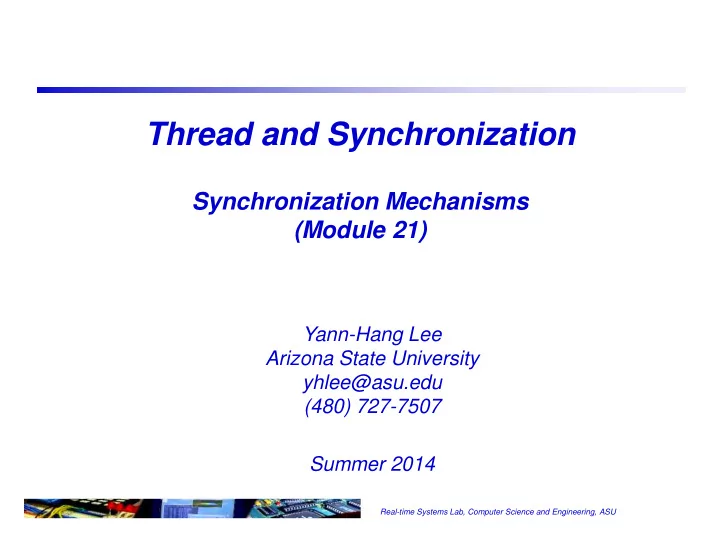

Thread and Synchronization Synchronization Mechanisms (Module 21) Yann-Hang Lee Arizona State University yhlee@asu.edu (480) 727-7507 Summer 2014 Real-time Systems Lab, Computer Science and Engineering, ASU
Kernel Semaphores struct semaphore: count, wait queue, and number of sleepers void sem_init(struct semaphore *sem, int val); // Initialize a semaphore’s counter sem->count to given value inline void down(struct semaphore *sem); //try to lock the critical section by decreasing sem->count inline void up(struct semaphore *sem); // release the semaphore blocked thread can be in TASK_UNINTERRUPTIBLE or TASK_INTERRUPTIBLE (by timer or signal) Special case – mutexes (binary semaphores) void init_MUTEX (struct semaphore *sem) void init_MUTEX_LOCKED(struct semaphore *sem) Read/Write semaphores 1 Real-time Systems Lab, Computer Science and Engineering, ASU
Spin lock vs Semaphore Only a spin lock can be used in interrupt context, Only a semaphore can be held while a task sleeps. Requirement Recommended Lock Low overhead locking Spin lock Short lock hold time Spin lock Long lock hold time Semaphore Need to lock from interrupt context Spin lock Need to sleep while holding lock Semaphore Other mechanisms: Completion: synchronization among multiprocessors The global kernel lock (a.k.a big kernel lock, or BKL) Lock_kernel(), unlock_kernel() RCU – read-copy update, for mostly-read access 2 Real-time Systems Lab, Computer Science and Engineering, ASU
Blocking Mechanism in Linux Kernel ISR can wake up a block kernel thread which is waiting for the arrival of an event Wait queue Wait_for_completion_timeout specify “completion” condition, timeout period, and action at timeout “complete” to wake up thread in wait queue wake-one or wake-many struct completion { unsigned int done; wait_queue_head_t wait; struct semaphore { }; raw_spinlock_t lock; unsigned int count; struct list_head wait_list; struct __wait_queue_head { }; spinlock_t lock; struct list_head task_list; }; 3 Real-time Systems Lab, Computer Science and Engineering, ASU
Wait_for_Completion Example In i2c-designware-core.c Threads call i2c_dw_xfer will do INIT_COMPLETION(dev->cmd_complete); i2c_dw_xfer_init(dev); ret = wait_for_completion_interruptible_timeout(&dev->cmd_complete, HZ); In i2c_dw_xfer_init, interrupt get enabled In i2c_dw_isr, when xfer is done complete(&dev->cmd_complete); 4 Real-time Systems Lab, Computer Science and Engineering, ASU
Mutex in Linux Two states: locked and unlocked. if locked, wait until it is unlocked only the thread that locked the mutex may unlock it Various implementations for performance/function tradeoffs Speed or correctness (deadlock detection) lock the same mutex multiple times priority-based and priority inversion forget to unlock or terminate unexpectedly Available types normal fast error checking recursive: owner can lock multiple times (couting) robust: return an error code when crashes while holding a lock RT: priority inheritance 5 Real-time Systems Lab, Computer Science and Engineering, ASU
Pthread Futex Lightweight and scalable typedef struct ulock_t { long status; In the noncontended case can be } ulock_t; acquired/released from userspace without having to enter the kernel. lock is a user-space address, e.g. a 32-bit lock variable field. “uncontended” and “waiter-pending” kernel provides futex queue, and sys_futex system call invoke sys_futex only when there is a need to use futex queue need atomic operations in user space race condition: atomic update of ulock and system call are not atomic 6 Real-time Systems Lab, Computer Science and Engineering, ASU
Reader/Writer -- ISR and Buffering Input: single producer (ISR) and single consumer (thread) If a read is initialed by the thread calls “ read” with a buffer of n bytes initiate IO operation, enable interrupt ISR reads input and store in the buffer. If done, signal the completion Blocking or nonblocking in thread context (e.g. vxWorks) – semaphore, lock in kernel context (Linux) – wait queue Guarded access Lock (mutex) and interrupt lock (disable) 7 Real-time Systems Lab, Computer Science and Engineering, ASU
Recommend
More recommend